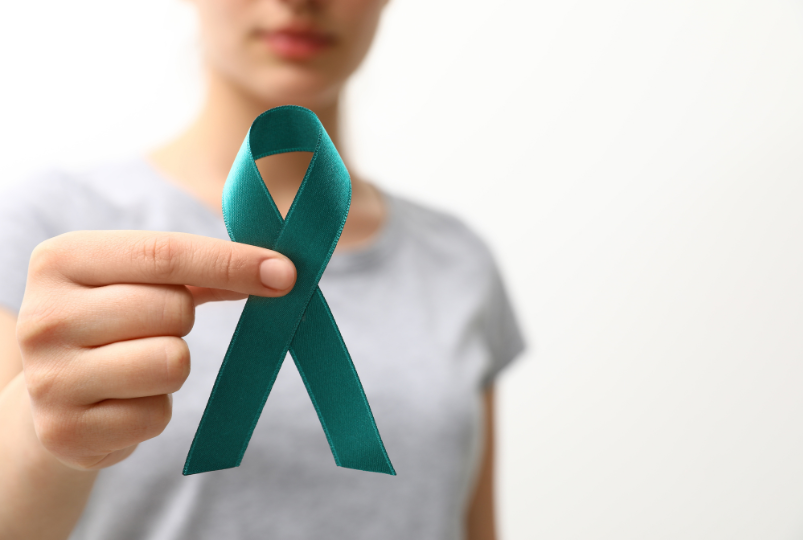This March is Ovarian Cancer Awareness month, so let’s talk about ovarian cancer. With around 7,500 women diagnosed each year with ovarian cancer, it is now recognised as the sixth most common cancer found in women. Ovarian cancer affects the ovaries and fallopian tubes when normal cells mutate and multiply in an uncontrolled way forming a cancerous tumour. As the cancerous cells grow they can affect nearby tissue and spread throughout the body.

There are different forms of ovarian cancer each one is dependent on what tissue or cell the cancer begins to grow in.
As you would expect, the sooner diagnosis is made the easier it is to treat, although treatment will depend upon the type, stage and grade of ovarian cancer.
Know the Symptoms of Ovarian Cancer
The symptoms of ovarian cancer can be common place in other very common conditions such as IBS, although you would experience them repeatedly throughout the month (more than 12 times during a month).
Bloating – swollen tummy
Stomach pain – tenderness and pain in your stomach or abdomen (pelvic region)
Loss of appetite – having difficulty eating, feeling full quickly or not feeling hungry
Urgency – needing to urinate urgently or more often
Other symptoms may include dyspepsia, bowel changes, fatigue, back pain, vaginal bleeding post menopause and weight loss whilst not trying to diet.
When to See a GP – Recognising the Warning Signs
If you have any of the symptoms mentioned, see a GP. Whether the symptoms are due to ovarian cancer or not, it’s best to seek professional advice, especially if the symptoms are frequent or are becoming worse.
What Causes Ovarian Cancer? Key Risk Factors
Any woman with ovaries, can develop ovarian cancer but the risk of developing it does increase as you get older: over 50% of women in the UK who develop ovarian cancer are over 65 years of age. Your chances of developing ovarian cancer may be greater if you have:
- a hereditary faulty gene
- had previous radiotherapy treatment for cancer.
- had bowel or breast cancer.
- have endometriosis.
- had late menopause (over 55 years) or early onset of your menstrual cycle
- had no children.
- are taking HRT.
- are overweight.
- smoke
Can You Reduce Your Risk of Ovarian Cancer? Prevention Tips
To lower your risk of developing ovarian cancer it’s best if you try to lead a healthier lifestyle. Give up smoking and eat a healthy diet, if you’re overweight then try to lose weight.
If you have a history of ovarian cancer in your family, speak to a GP and ask about testing including looking for BRAC gene and Lynch Syndrome.
Research suggests that using the combined oral contraception can help reduce a woman’s risk of developing ovarian cancer.
Birth and breastfeeding can help reduce the number of times a woman ovulates during her menstrual cycle and this can help reduce the risk of developing ovarian cancer.
How Is Ovarian Cancer Diagnosed? Tests and Screening Options
The most common treatment for ovarian cancer is surgery to remove the cancerous cells followed by chemotherapy, either oral medication of intra venous therapy. If caught early 90% of women with ovarian cancer can be successfully treated. Of course, all treatment options will depend on how advanced the stage of cancer is when diagnosis is made.
How ROC Can Help – Expert Assessments and Diagnostics
Our experienced, professional team of experts are on hand to offer you bespoke assessments and diagnostics. We will guide you gently through examination, and tests where our Physicians can provide you with advice regarding any diagnosis and treatment options. Get in touch!
References
Ovarian Cancer Action: https://ovarian.org.uk/ovarian-cancer/brca/what-are-genetic-mutations/
Target Ovarian Cancer UK: targetovariancancer.org.uk/
Cancer Research: https://www.cancerresearchuk.org/about-cancer/ovarian-cancer/treatment/treating-symptoms-
NHS: https://www.nhs.uk/conditions/ovarian-cancer/symptoms/
ROC Clinic: https://rocprivateclinic.com/

